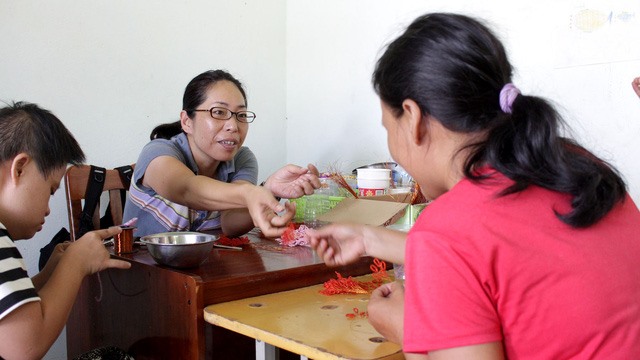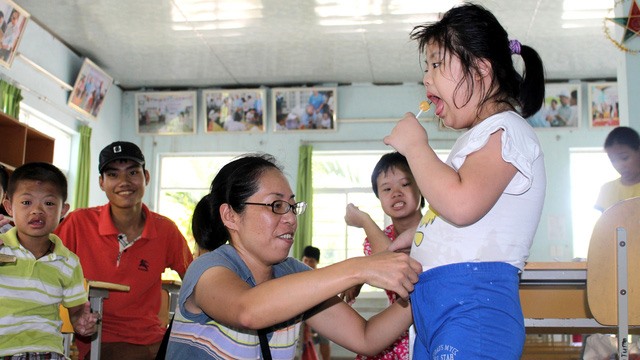Japanese volunteer changes lives of AO kids
A group of 10 children affected in different ways by Agent Orange (AO) look intently as ‘Teacher Yo’ threads beads with a thin string to make bracelets.
 |
| Japanese teacher Yo (center) teaches AO affected children to thread beads and make bracelets. |
Once they get it, they start doing it on their own, and show the results to Yo with excitement. They are rewarded with a bright smile and compliments from their teacher.
These were children who barely communicated with anyone before ‘Teacher Yo’ came into the picture.
Nonoyama Nobuy, a volunteer teacher with the Japan International Cooperation Agency, is working with the children at the Protection and Assistance Centre for Victims of AO and Disadvantaged Children in the Hoa Nhon Village, Hoa Vang District, Da Nang.
Before coming to Viet Nam, Yo lived in Japan’s Nagoya City with her husband and parents. Her decision to work in Viet Nam was not welcomed by her relatives initially, but she managed to persuade them. She said that when she came here, the only ‘luggage’ she carried was love and compassion for disadvantaged children.
Over more than 10 years of doing community service in Japan, she gained a lot of experience in taking care of children with various difficulties.
Yo not only teaches her trainees how to draw, thread beads and make various handicraft products, she also gains the children’s confidence with the little Vietnamese she knows with a lot of gestures.
Ms Nguyen Thi Cam Vang, the Deputy Director of the Centre, said: “Since Yo came here, the children smile, ask and express their ideas more. They teach her Vietnamese. She teaches them skills and how to be confident. Each time she comes to classroom, the children surround her. They miss Yo whenever she takes a day off.”
Yo has a camera with her all the time, and takes pictures of the children at different moments, when they are smiling and when they are sulking.
One of the children she pays a lot of attention to is Nguyen Hoa Nien who showed no awareness of anything around him and never communicated with anyone. At 10, Nien is still small and stayed in bed all the time.
After the class, Yo usually visits Nien at his bed and gives him warm hugs. Nien has begun to follow her instructions and learnt simple signs and words. Now he knows how to wave, smile and bend his head to thank people who give him presents.
Mr Nguyen Nghi, Nien’s father feels very happy to see his son progress over the past one year that Yo has been interacting with him.
“I have never believed my son can do such things. Now he can play Japanese games and beat teacher Yo. For my family, teacher Yo is like a dream,” he said.
 |
| Yo tends to a girl with disabilities. - Photos tuoitre.vn |
Ms Nguyen Thi Hien, the Chairman of the Da Nang’s Association for Victims of AO said Teacher Yo has also become partner of others who work at the centre.
She said several teaching methods used by the centre’s teachers had not been successful, despite careful preparation.
Yo came and introduced new, effective Japanese teaching methods, changing the atmosphere in the centre’s classes. Now children follow regulations stuck on the classroom walls.
“Yo is admirable. The discipline and strictness combined with love has been very effective. We have to learn a lot from Yo,” said the Centre’s Deputy Director Vang.
Yo said that her biggest happiness is seeing the disadvantaged children mature, day after day. She said the work also motivates her to study and find and practice new, interesting teaching methods.
Yo does not get away from her children even during weekends. She rides her motorbike to markets in the city centre and looks for teaching materials that can help the AO-affected children develop their skills.
Reflecting on a year in Viet Nam, Yo said: “I never thought that I would come to Viet Nam and bond so well with disadvantaged children here. Everything has changed now. I really love this place and want to attach my life to it.”
(Source: VNS/ DA NANG Today)